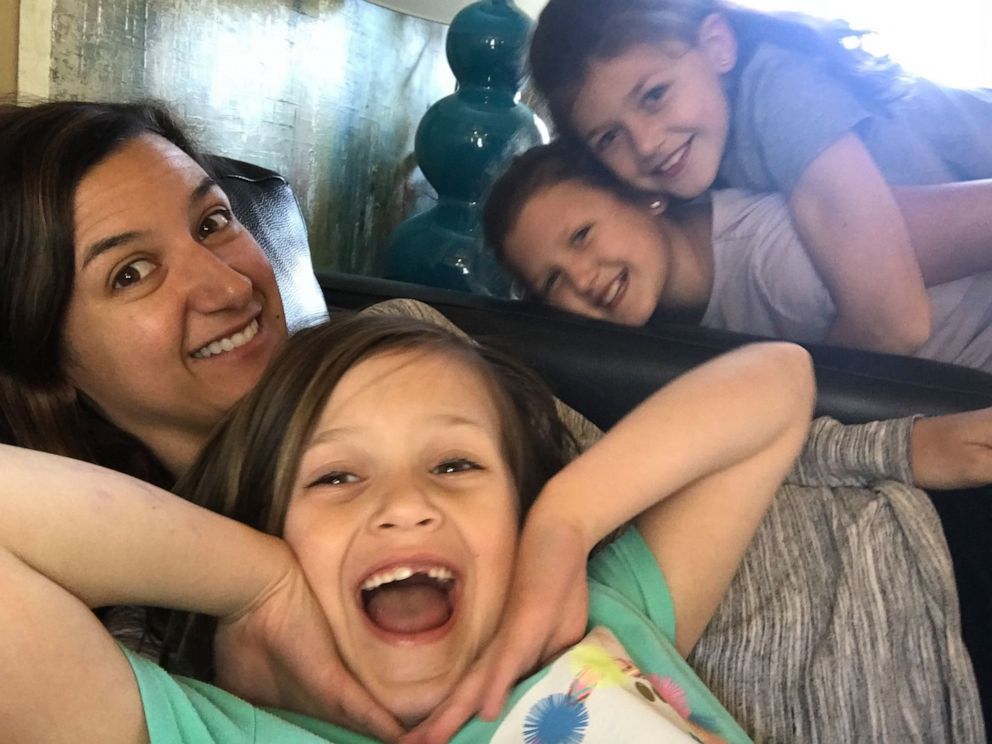Mom's viral reaction to daughter's accident sparks debate on punishing kids
"It's very important not to corrupt the relationship between my daughter and I."
A North Carolina mother's viral Facebook post is igniting conversations surrounding parenting styles, and how to approach your child when they've done something wrong.
Rosie Lamphere, co-founder of the blog Play At Home Mom, recently shared an incident with followers describing how her kids put a hole in the wall.
Lamphere, of Raleigh, explained how she addressed the situation with her daughters, Sienna, 8, Mia, 9, and Briella, 11:
She didn’t need me to make her feel guilty.
She didn’t need me to shame her.
"I’m sorry!!!”"
I know you are.
"Daddy is going to be so mad!!! I’m not ready to tell him yet."
That is OK. When you are ready, you will tell him.
She knew. She knew that he was the one most impacted by this. He would be the one taking time from his day to fix this.
Lamphere went on, sharing how she and her spouse knew they had two choices:
1. Scream and yell and make her feel more awful than she already does. 2. Accept that little girl for each bit of awesome that she is ... even in her mistakes. To realize that it was SO hard for her to come down and tell you how she made a mistake.
Our response will 100% determine how she comes to us with mistakes in the future.
"My husband, if it was anything to test his patience this was it -- so it was comical," Lamphere told "Good Morning America," explaining how her girls accidentally ran into the wall and one of them offered allowance money for the damages. "For me, I think it's very important not to corrupt the relationship between my daughter and I. The consequence was the hole in the wall and she had already experienced all the guilt from that. She didn't need anything from me."
"Communication is very important with our children," Lamphere added. "We talk about mistakes a lot. No one's perfect. We try to show them how we can be vulnerable ... it's important for them to see that so she [knows] we are not superheroes as parents."
Lamphere's post on Play At Home Mom's Facebook page garnered 249,000 shares and 27,000 comments, many of which applauded the mother of three for her grace.
"So very important. We as adults make mistakes and have accidents too. We're human," one wrote.
Others shared personal experiences.
"This made me super emotional. I wonder if I'd still be the anxious, fearful mess I am today if I had been raised the way you raise your daughters," one said.
"The same thing happened recently to us but it was because of a meltdown," another commented. "I sat on the floor with her. I didn't yell. I tried to meet her where she was emotionally."
Other parents, however, said Lamphere's calm approach wouldn't work in their home.
"I have kids who feel no remorse," a mother wrote. "Parenting is impossible."
Dr. Stephanie Samar, a clinical psychologist at the Mood Disorders Center of the Child Mind Institute, said as a parent, your reaction should be in line with your priorities.
"It depends on who your kid is, what you're working on with your kids and what you want your kid to learn," Samar told "GMA." "How you respond is dependent on what your goals are as a parent."
But relying heavily on punishment may only put out "small fires" rather than creating long term, sustainable change, Samar added.
"Our natural urge is to go to punishment, if we're angry or hurt or upset -- the urge is to retaliate," she explained. "But really, if we’re thinking about parenting, we are thinking about learning and teaching and these very big, long term goals for our children."
"Punishment doesn’t really achieve that."

Here, Samar offers tactics for choosing appropriate consequences.
Genuine expression: Be careful about your emotions
Since children learn through modeled behavior, try not to yell and scream if you do not want them to scream and yell at others.
“Express emotion in the way we'd want them to respond to others,” Samar noted.
Take a pause for yourself
This way, you can think objectively on how you’ll deal with the issue at hand.
Get on their level
Kneel down, hold eye contact and keep explanations short so you won’t lose their attention.
If removing privileges, make sure it's short term and age-appropriate
For younger children, keep it to a few minutes to a couple of hours. For older kids and teens, maybe it’s 24 to 48 hours. Taking punishments far beyond this is a waste considering the learning experience has already happened, Samar said.
"Because the longer the punishment goes, as well as the more often parents use it, kids lose sight of what they’re being punished for.”
Samar said the right approach could encourage your child to confide more in the future.
Lamphere agreed, saying in her post that her daughter "walks around with a little more trust."
"She walks around feeling loved and connected," she wrote. "She walks around knowing that she can tell her parents anything and that she is safe."




